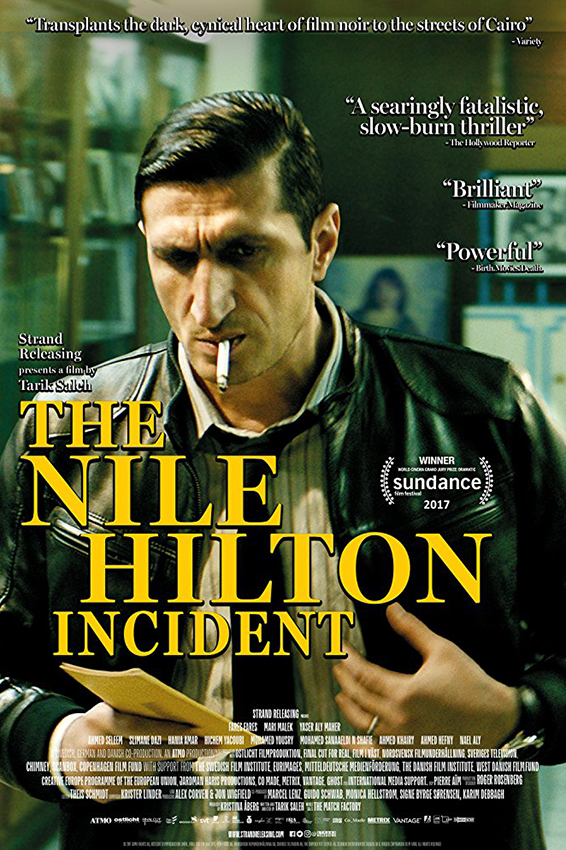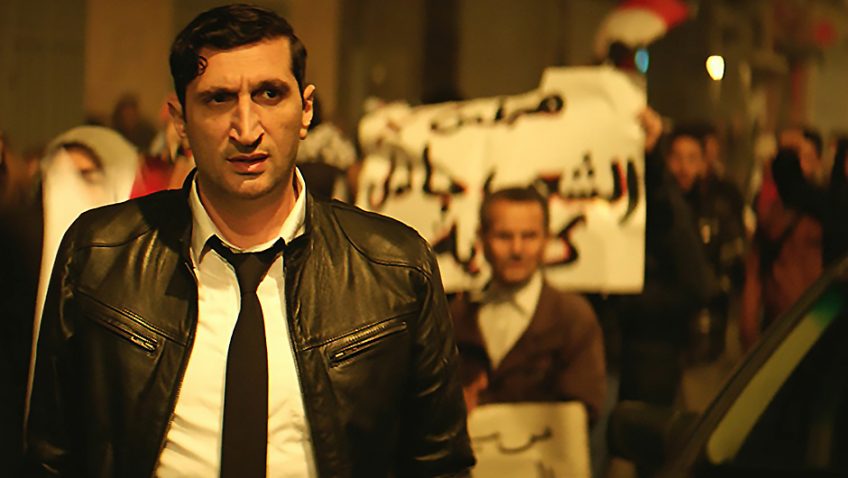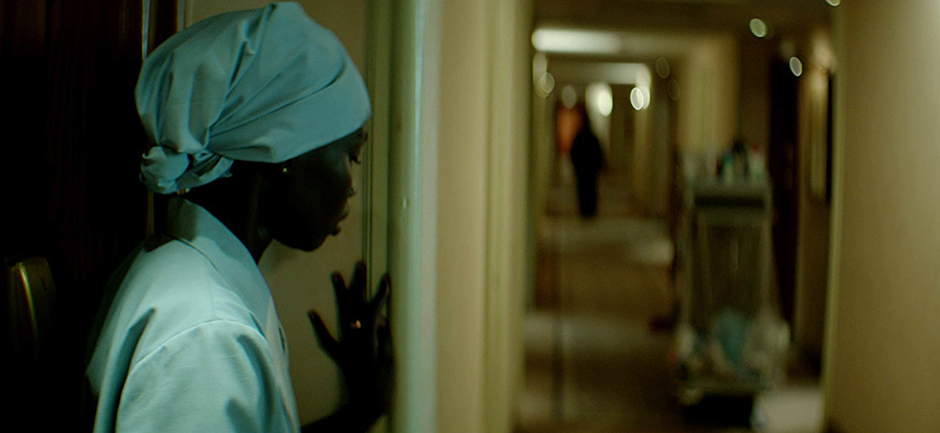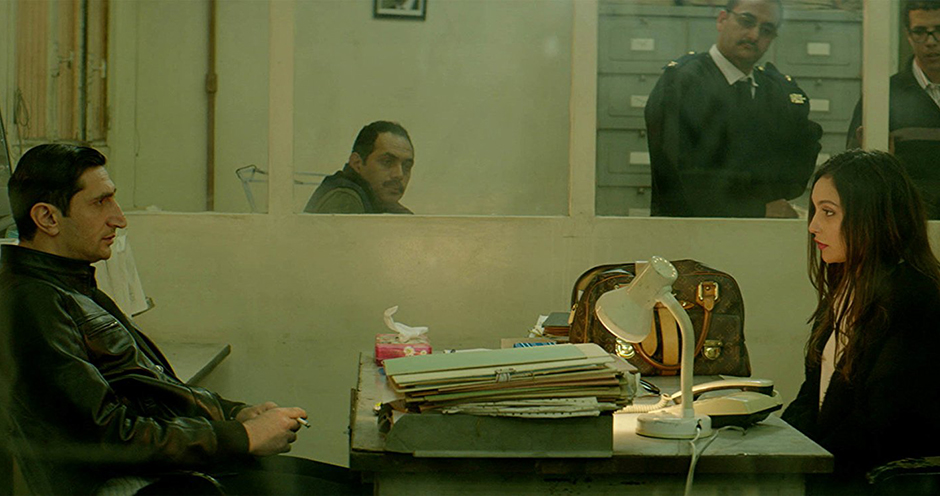Joyce Glasser reviews The Nile Hilton Incident (March 2, 2018) Cert 15, 111 min.
Tarik Saleh, a Swedish television producer, animator, publisher, journalist and film director of Egyptian descent might be best known as one of Sweden’s most prominent graffiti artists, but no more. The Nile Hilton Incident is an intriguing and compelling film noir thriller and police procedural. Its protagonist, Noredin Mostafa (Fares Fares), a smart, chain smoking flawed cop battling his demons, can stand up to the best of his American and British counterparts.
 Equally intriguing, the film is based on a real, sordid murder case. Suzanne Tamim, 30, a beautiful singer, popular in the Arab world, was murdered in her flat in Dubai by a hitman who slit her throat. The hitman was hired by Egyptian businessman and lawmaker Hisham Talaat Moustafa in 2008. Saleh sets this fictional murder inquiry just before and during revolution of 25 January 2011 that ended the government of Hosni Mubarak, but not the corruption in Egyptian politics and its justice system.
Equally intriguing, the film is based on a real, sordid murder case. Suzanne Tamim, 30, a beautiful singer, popular in the Arab world, was murdered in her flat in Dubai by a hitman who slit her throat. The hitman was hired by Egyptian businessman and lawmaker Hisham Talaat Moustafa in 2008. Saleh sets this fictional murder inquiry just before and during revolution of 25 January 2011 that ended the government of Hosni Mubarak, but not the corruption in Egyptian politics and its justice system.
Veteran cop Major Noredin Mostafa is a bent cop, but in the Cairo police force, everything is relative. He is to find out that everyone else, and especially his uncle, Kamal (Yasser Ali Maher) who is his commander and protector, is far worse. Saleh is no doubt aware that many Arab speaking viewers will recall that the hitman in the Suzanne Tamim murder was a former police officer.
When we first meet Noredin he is driving around the smoggy slums of Cairo collecting protection money. It is second nature to him to fish in the pockets of suspects and victims and transfer any cash into his pocket. If not him, then some other cop will take it. He can give as well as he can take, and there’s an almost comical scene in which Noredin bribes the head of rival police district to hand over his suspect, right in front of the mocking prisoner.
With the help of his cagey uncle, Noredin is a rising star in the force, but he’s kept on a tight rein. Politics determine who can be questioned and who is apprehended and even what cases are investigated. Noredin’s life changes when he is assigned to the Nile Hilton murder, a murder that his superiors would like to go away as quietly as possible. ‘Use silk gloves’, Kamal tells him in a warning that echoes through cop movies the world over. ‘It’s a very sensitive case.’
In his investigation Noredin displays sensitivity, astute judgment, sound training, integrity, diplomacy and even compassion. What proves Noredin’s undoing, however, is his determination to expose the culprits. Noredin declares that it looks like a professional job. A captain present disagrees: with a woman this beautiful, it’s a crime of passion.’
Lalena, a singer whose face is all over the billboards of Cairo is found murdered in the Nile Hilton Hotel, and the sole witness is a Nigerian cleaner, Salwa (Mari Malek) who is sent home – home being a fetid, cramped two room flat in a tenement where she lives with two other women under the control of Clinton, known as ‘The Mayor’ (Ger Duany). Noredin tells Clinton to produce Salwa if he wants his identity papers back. Few tears are shed when Clinton meets his maker but Salwa knows that her life is in danger. When she returns to work, the hotel manager tells her that Lalena, Noredin learns, was no angel. She had a sideline as a prostitute working with a scumbag pimp Nagy (Hichem Yacoubi) in a honey trap scam where compromising photos are used to blackmail Lalena’s prominent clients. When Noredin finds the photo claim slip and looks at the photos, he finds his chief suspect: Shafiq (Ahmed Selim) a real-estate tycoon and member of the Egyptian Parliament who is a clear reference to Moustafa.
A film noir would not be a film noir without our detective, grieving for his deceased wife, having an affair with the victim’s best friend, the equally beautiful Gina (Hania Amar). He knows it will compromise the investigation, but Kamal is already asking him to drop the Nile Hilton case because it was a suicide. Noredin is incredulous? Suicide? Her throat was slit.
Noredin seems to have a suicide wish, too. Film noir protagonists are frequently smokers, breathes nicotine instead of air. He lights a new cigarette while putting out the previous one. If the Los Angeles smog is a character in several films noirs, the black cloud over Cairo is symbolically ominous.
Subtly and gradually Saleh reveals information about Noredin. When he shelters witness Salwa in his flat (think Bruce Willis in Mercury Rising), Selwa picks up a photo and asks who it is. When Noredin says it’s his wife, the young girl’s comment, ‘she’s beautiful,’ compounds the loss. There is another scene in which Noredin is called away from work to care for his elderly father. Though he is only seen once, the father becomes the conscience of the film. Rejecting his son’s money, which he knows is stolen, he says, ‘you can’t buy dignity, son.’
In the dramatic climax the investigation merges with the manifestations on the street where the protestors, furious about the government firing on innocent people, retaliate on anyone in a uniform. Neither part of the old order nor of the new, Noredin’s future looks as bleak as the fledgling revolution.
Although the film does not delve into the specifics of the real murder case, Egyptians in particular will know that Hisham Moustafa was pardoned last year by former General (now President) Fattah el-Sisi, having served less than half of his prison sentence already reduced on appeal. Moustafa’s link with the Attorney General’s office was concealed during the trial, and five journalists were charged for breaching the gagging order.
You can watch the film trailer here:






